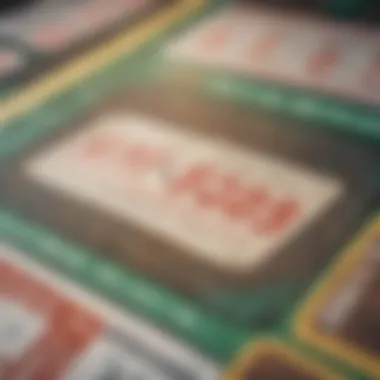Effective Strategies for Choosing Lottery Tickets


Intro
Selecting the right lottery ticket can feel like an exercise in futility for many, a mere gamble in a game that often seems rigged from the start. However, there’s more than meets the eye when it comes to choosing that elusive winning ticket. Blending statistical data and psychological insight, you can transform your approach into something far more strategic. This article serves as a comprehensive guide, shedding light on various methods and considerations that can improve your chances at success.
From understanding the basics of lottery game structure to diving into advanced techniques that specific players have found effective, we aim to provide you with a myriad of options to explore. The journey of selecting a winning ticket is not just about chance; it’s about informed decision-making. It’s a bit like piecing together a puzzle, where each piece holds the potential to unlock a brighter picture.
As we traverse this discourse, expect to encounter practical insights and strategic frameworks that will enhance your ticket selection process. Armed with this knowledge, you can approach each lottery ticket with a new perspective, turning what was once random guessing into a calculated risk. But before we unpack those strategies, let’s first delve into the game strategies that can serve as your foundation.
Understanding Lottery Mechanics
Understanding the mechanics of lotteries is crucial for anyone looking to improve their chances at winning. It provides the groundwork for making strategic decisions regarding ticket selection. If you comprehend how lotteries work, you become better equipped to navigate the complexities inherent in each game. This knowledge reveals the structure behind the draws, the designs of various games, and the implications of your choice on potential outcomes.
Three primary elements stand out when discussing lottery mechanics: the basics of draws, the types of lotteries available, and how these components interlink. Whether it’s traditional number draws or multi-state lotteries, recognizing their unique attributes can steer you towards a more informed selection process.
The Basics of Lottery Draws
Lottery draws function essentially as random events where a subset of numbers is selected from a broader pool. When participating in a lottery, the key aspect to remember is that each number has an equal chance of being drawn. This randomness is both the allure and the challenge of lotteries—the thrill of not knowing the outcome contrasts dramatically with the methods you might use to choose your numbers.
Another vital point is the timing of draws. Different lotteries have varying schedules, and understanding when these draws occur can affect accessibility for buyers. It's not just about buying a ticket but also knowing the mechanics that dictate when your numbers might be called.
Types of Lotteries Available
Lotteries come in diverse formats, each with distinct rules and potential rewards. The main types include traditional number draws, instant win games, and multi-state lotteries. Let’s delve into these categories.
Traditional Number Draws
Traditional number draws are perhaps the most recognized form of lottery. Players choose a set of numbers, which are then compared against the drawn numbers at a specified time. What makes these draws appealing is their straightforwardness. People find comfort in the regularity of weekly draws, often anticipating the spectacle together as a community.
A key characteristic of traditional number draws is their simplicity in gameplay compared to other types. They often have larger jackpots since they pool contributions from many players, which enhances the potential winnings. However, a disadvantage of this format is that the odds can be quite challenging. Depending on the game, the probability of hitting the jackpot can be exceedingly low, which might deter some players.
Instant Win Games
Instant win games change the lottery landscape by offering immediate gratification. As the name suggests, players can check if they’ve won right away, either through scratch-off tickets or online instant games. This form appeals to those seeking quick results without the wait that traditional draws require.
The key characteristic here is the constant thrill of purchasing a ticket and revealing the outcome instantly. The excitement of possibly winning can be infectious, making these games popular. However, the potential for lower jackpots in comparison to traditional draws exists. Furthermore, the chances of winning smaller amounts may outstrip those of the jackpots, leading to disappointment if expectations are not well managed.
Multi-State Lotteries
Multi-state lotteries present an exciting option that combines player pools across different states, leading to colossal jackpots that can sometimes reach into the hundreds of millions. This collaborative approach allows for larger prize pools and broader participation, increasing the rewards to participants.
These lotteries often feature elaborate games with intricate rules, adding layers of complexity. The key advantage is the chance at life-changing sums of money. However, the odds of winning can resemble those of traditional lotteries, often leading you to grapple with the very low likelihood of winning the grand prize.
"By comprehending these various lottery types, players can better tailor their strategies based on personal preferences and risk appetites."
In summary, diving into understanding lottery mechanics encourages smarter and more deliberate ticket choices. The insight gained from grasping the basics of lottery draws, combined with familiarity with different lottery types, primes you for a more rewarding experience in your ticket purchasing journey.
Statistical Analysis in Lottery Selection
Understanding the realm of lottery ticket selection is not merely an act of chance, it involves a meticulous approach that hinges on statistical insights. Statistical analysis provides gamblers with tools to decipher patterns, trends, and probabilities inherent in lottery draws. This section delves into how leveraging statistical methods can significantly inform your choices when buying tickets, potentially increasing your odds in this unpredictable game.


Historical Data Examination
Examining historical data is akin to scrutinizing blueprints before constructing a building; it outlines the foundation upon which successful ticket selection can stand.
Frequency Analysis of Winning Numbers
Frequency analysis centers around the concept of tracking how often certain numbers appear in winning combinations over time. The primary allure of frequency analysis is its potential to highlight trends that may otherwise go unnoticed. For instance, if a particular number has emerged frequently during recent draws, one might consider it 'hot'. Conversely, numbers that seldom appear might be labeled as 'cold'. While this method can bolster one’s strategy, it’s crucial to remember that past performance doesn't guarantee future results. It's a popular tactic among avid players as it aligns with their instincts, making them feel more in control of their choices. However, reliance on this approach can lead to misconceptions, as luck remains an unpredictable factor.
Jackpot Trends Over Time
Jackpot trends delve into how jackpots fluctuate, guiding players on when to step into the fray. Observing jackpot size over time can uncover patterns; for example, larger jackpots may stimulate player interest, which in turn affects ticket purchases. Recognizing these trends can inform when to buy, as many believe it's wise to participate when the jackpot swells significantly. This method stands out due to its link to human behavior in gaming; players often gravitate towards opportunities they deem more lucrative. Yet, analyzing these trends must be approached with caution, as high jackpots often lead to saturated ticket purchases, diluting one’s chances.
Understanding Odds and Probabilities
Rather than dabbling in luck alone, a thorough grasp of odds and probabilities strengthens one’s position in the lottery game.
Calculating the Odds of Specific Games
Calculating game odds involves examining the structure of different lotteries, each with their distinct probability frameworks. For instance, state lotteries often present better odds compared to multi-state games, where the odds of winning the big prize can plummet. By understanding these odds, players can make informed decisions about which games to enter, adding a strategic layer to their approaches. This method is beneficial in that it raises awareness about one's risk level—effectively weighing the chances against potential rewards. Nevertheless, translating these calculations into effective choices can still be tricky, as overly favorable odds might attract a large player base, subsequently negating individual advantages.
Comparative Analysis of Various Lotteries
This involves evaluating different lottery options side by side to discern which might offer the best odds or return on investment. Some lotteries may afford larger prizes but have poorer odds due to their vast player base. Engaging in this comparative analysis encourages players to be more strategic about their expenditure. It stands out as a beneficial choice largely because it empowers players to optimize their investments. However, it can also lead to analysis paralysis, where players may overthink their decisions, contributing to indecision at crucial moments.
"Luck is what happens when preparation meets opportunity."
In essence, combining statistical analysis with an understanding of the emotional and behavioral aspects of lottery gaming equips players with insights necessary for better selection strategies. Though no method guarantees winning the jackpot, this informed approach enhances the overall experience, making the lottery not just a game of chance but a calculated endeavor.
Psychological Factors at Play
Understanding the psychological factors that influence lottery ticket selection can significantly affect your approach to playing the lottery. These elements include cognitive biases, emotional impulses, and social behaviors that shape how players make decisions. By grasping these influences, you can learn to steer your choices away from common pitfalls and towards more informed strategies that align with your overall goals in the game.
The Gambler’s Fallacy
The Gambler’s Fallacy refers to the mistaken belief that past events affect the probability of future outcomes in a random process. For instance, if a certain number hasn’t been drawn in a while, some players might feel it’s "due" to appear, thus opting to play that number more frequently. This fallacy may lead players to pick numbers influenced by trends seen in previous draws, rather than recognizing the randomness inherent in the lottery system.
Understanding this fallacy helps you abandon unproductive patterns and focus on a more systematic approach to your number selection, minimizing emotional biases and enhancing your decision-making process.
Emotional Influences on Ticket Selection
Emotional factors can dictate how individuals select lottery tickets. Various feelings—ranging from excitement to anxiety—can cloud judgment during the decision-making process.
Buying Tickets as a Social Activity
Buying tickets can often take on a social dimension. Whether it's a casual Friday night with friends or an office pool, many people engage in lottery ticket purchases collectively. This shared experience fosters a sense of camaraderie and adds a layer of excitement that can enhance enjoyment. While this may seem like a fun and beneficial choice, relying solely on group dynamics could lead to poor decision-making. Group think can sometimes lead to a consensus on ‘lucky’ numbers that might not have statistical backing. It's crucial to balance the social aspect with informed choices to maximize your lottery experience.
The Role of Personal Bias
Personal bias plays a pivotal role in how individuals select their numbers. This bias can stem from various sources such as personal experiences, cultural beliefs, or even popular trends. For instance, some players consistently choose dates significant to them, like birthdays or anniversaries. While it may feel meaningful and comforting, limiting choices this way often excludes higher number ranges that are usually less played, thereby reducing chances of sharing a win with others. Recognizing this bias allows players to broaden their horizons, mixing personal favorites with cold and hot numbers to strike a balance between personal connection and statistical advantage.
As you navigate the complex landscape of lottery ticket selection, being mindful of these psychological factors can sharpen your strategy. While the odds may inherently favor the house, understanding your own mindset can help you approach the lottery with a clearer head, ultimately leading to a more rewarding experience.


Choosing Your Numbers Wisely
When it comes to participating in the lottery, choosing the right numbers can make all the difference between a thrilling experience and a futile endeavor. This section delves into various methods for selecting numbers, emphasizing their benefits and considerations. Despite the inherent randomness of lottery draws, having a thoughtful approach to number selection can enhance the overall lottery experience, increasing satisfaction regardless of the outcome.
Common Strategies for Number Picking
Using Birthdays and Anniversaries
One common method that people often use involves basing their number choice on birthdays and anniversaries. This strategy hinges on the emotional significance of dates, allowing players to personalize their ticket and infuse it with sentimental meaning.
The key characteristic of this method is its relatability—many individuals connect with their birthdays or significant anniversaries, making the lottery feel less like a game of chance and more like a personal event. This emotional boost can create a sense of excitement and anticipation when awaiting draw results.
However, there are some unique features to consider. Most lotteries require players to select numbers over a specific range, often running from 1 to 49. Since most people’s birthdays only encompass the months of January through December, it limits the selection to numbers 1 through 31. This can result in playing numbers that are relatively common, potentially leading to sharing winnings in case of a jackpot win. This is an advantage as it gives players a readily available strategy, but it also has the disadvantage of increased competition on more chosen numbers.
Random Number Generators
On the other end of the spectrum, using random number generators offers a different approach entirely. This method removes the emotional biases and personal connections from the selection process. Instead, the numbers generated are entirely arbitrary, reflecting the randomness of the lottery itself.
The hallmark of this approach is its impartiality. By relying on a machine to select numbers, players can access selections that might not typically come to mind. For many, this can lead to a sense of liberation, allowing them to engage with the game devoid of emotional investment.
Nonetheless, random number generators also present a unique feature worth noting. In numerous online platforms and apps, these generators often produce unique combinations, which might deviate greatly from popular number sets, like those derived from dates. Thus, it can be a strategy that mitigates the risk of sharing a jackpot with many others, leading to potentially higher individual winnings if luck strikes. However, some individuals may feel a disconnect from the randomness, wishing for a stronger sense of agency in their selections, which can make this method feel somewhat less personal.
Analyzing Cold and Hot Numbers
This method revolves around the idea of
- Hot numbers, which are frequently drawn in recent games.
- Cold numbers, those that haven’t been seen in draws for a notable period.
Proponents believe that players have a higher chance of selecting winning numbers by choosing these hot numbers, while others argue that cold numbers are due for a win based on probability and patterns observed over time.
When analyzing this data, it’s crucial to put emotional biases aside. By focusing on historical trends, players can make informed decisions, stripping away some of the randomness intrinsic to the game. This analysis provides a fascinating blend of statistics and psychology, allowing players to engage with the lottery on a deeper level.
Buying Strategies and Timing
Choosing the right moment to buy a lottery ticket can be as pivotal as the numbers you select. Not only does this influence your potential luck, but it also touches on the deeper psychological aspects of gambling behaviors. Understanding when to purchase tickets can increase your chance at success and enhance the overall excitement of the lottery experience.
There are specific elements one must consider when delving into buying strategies and timing. The dynamics of ticket sales patterns, for instance, can often forecast peak buying times, which could lead to either greater opportunities or tougher competition.
When to Purchase Tickets
The Impact of Ticket Sales Patterns
Ticket sales patterns reveal interesting insights into lottery participation. When many people buy tickets, like during a big draw, the competition spikes. This is crucial to recognize because it highlights the number of potential winners to share a jackpot with, which could dilute your gains if you win. Conversely, buying tickets in less popular configurations can mean you might have a better chance of keeping your winnings all to yourself.
A key characteristic of understanding these patterns is timing your purchases right. Buying last-minute tickets might allow you to avoid the crowds; however, this could also lead to missing out on certain strategic opportunities. One unique feature of these patterns is their relation to emotional influences—people often rush to buy tickets after hearing about a big jackpot, driving sales up dramatically.
Benefits of recognizing ticket sale patterns include:
- Increased awareness of competition levels
- Insight into peak buying times for specific games
- Ability to gauge when jackpots might be larger or smaller


On the downside, focusing solely on sales patterns could also lead to a gambler’s illusion, where one begins to believe they can predict outcomes without statistical grounding.
Best Times to Buy Based on Game Dynamics
Understanding game dynamics can also play a significant role in your ticket purchasing strategy. Many lottery designs have a set rhythm, with specific timings for draws or special games. For instance, some games may see fewer players during weekday draws, making this a potential sweet spot for ticket buyers. This timing isn't just about convenience; it's about leveraging quieter moments in the lottery timeline to increase your odds in a less crowded arena.
A prominent aspect of this strategy is the emphasis on research. Some lottery games may have specific jackpot characteristics or promotional events leading to better odds. Keeping an eye on these trends can help you determine:
- Which games have the highest player participation on certain days
- When lower participation might lead to higher probabilities for wins
- Any promotional days that might offer better odds or bonuses
Ultimately, buying at the right times based on game dynamics can fortify your purchasing strategy effectively. However, this demands discipline and a systematic approach over time, which can be a double-edged sword. Some might find their strategies leading to obsession with timing rather than enjoyment of the process.
Group Play: Pros and Cons
Engaging in group play can be a diverse strategy that some lottery enthusiasts embrace, while others remain skeptical. Playing in a group allows for pooling resources for more tickets, which could increase winning chances substantially without a hefty out-of-pocket cost for any one individual. However, this approach isn’t without its drawbacks.
Pros of Group Play:
- More tickets mean broader coverage of number combinations.
- Shared expenses can encourage engagement without financial strain.
- Provides a sense of camaraderie and excitement within the group.
Cons of Group Play:
- If a win occurs, the jackpot would be divided among more participants, leading to smaller individual payouts.
- Trust issues can arise about ticket purchasing and sharing winnings.
- Tensions could brew if expectations aren’t properly managed.
In essence, group play, like all strategies, has its advantages and disadvantages that must be evaluated carefully. Finding the right group dynamics and setting clear agreements is key to making the most of this strategy.
Maximizing Lottery Experiences
Maximizing your experiences when playing the lottery goes beyond just the thrill of scratching tickets or waiting for numbers to be called. It involves understanding the intricate balance between enjoyment, responsible spending, and the occasional moment of insight that can elevate your gaming experience. By honing in on these elements, players can craft a lottery experience that is not just about potential winnings but also about having fun in a sensible manner.
Approaching the Game Responsibly
A crucial aspect of lottery gaming is approaching it with a sense of responsibility. This doesn't mean stripping away the excitement of the game; rather, it enhances your overall experience by ensuring you engage with it on your own terms. There’s nothing wrong with indulging in the occasional ticket purchase, but keeping it within the realm of a healthy hobby can make a world of difference.
Setting Budgetary Constraints
When considering any hobby or activity that involves potential financial strain, setting budgetary constraints is essential. Think of it as putting a cap on what you’re willing to spend, much like a limit on your entertainment expenses. Setting a firm budget emphasizes self-discipline and awareness. This practice can prevent the common pitfall of spending more than intended, which often leads to feelings of regret.
- Key Characteristic: A budget not only restricts spending but also serves as a guideline for how much you can comfortably allocate for lottery tickets.
- Why It’s Beneficial: This constraint helps preserve your financial health and ensures that lottery ticket purchases remain fun rather than a burden. There's a certain peace of mind that comes with being in control of your finances.
- Unique Feature: Setting a budget allows you to understand your spending patterns, which can lead to smarter choices about which games to play and how often. This can ultimately enhance your experience, as you’re not in a constant state of uncertainty about your financial well-being.
Recognizing Signs of Compulsion
While playing the lottery can be a light-hearted endeavor, it’s important to recognize when the fun turns into something more serious. This is where being mindful of compulsive behaviors comes into play. Recognizing signs of compulsion helps in maintaining a healthy relationship with the game, preserving enjoyment and preventing potential pitfalls.
- Key Characteristic: Compulsion often manifests in repeated purchases despite losses or an inability to stick to budget limits. Awareness of these signs is critical to prevent unhealthy gaming habits.
- Why It’s Popular: Realizing that one's enjoyment of lottery games can become detrimental is a valuable insight for players. Understanding this helps in creating a more sustainable approach to enjoying games without compromising personal well-being.
- Unique Feature: By recognizing these behaviors early, players can reassess their approach and recommit to enjoying the game in moderation, keeping the fun alive while ensuring it doesn't become an obsession.
Evaluating the Entertainment Value
Evaluating the entertainment value of lottery games focuses on understanding what you genuinely enjoy about playing. Is it the thrill of the draw? The social aspect of sharing tickets with friends? Perhaps it’s the excitement of the occasional win? Distinguishing between the enjoyment and the financial aspect helps frame your lottery experiences in a context that is fulfilling and entertaining.
"Enjoyment should always take precedence over financial gain in games of chance. The lottery, after all, is meant to be fun!"
Reflect on your motivations when playing the lottery. Keeping a journal about your experiences, the games played, and wins or losses could help in identifying patterns in what brings you joy. Such reflections can lead to informed decisions in future purchases, ensuring that every ticket holds the potential not just for winnings but for rich experiences as well.
By blending responsible approaches with a keen sense of enjoyment, players can optimize their lottery experiences, making it a delightful part of their entertainment repertoire.



